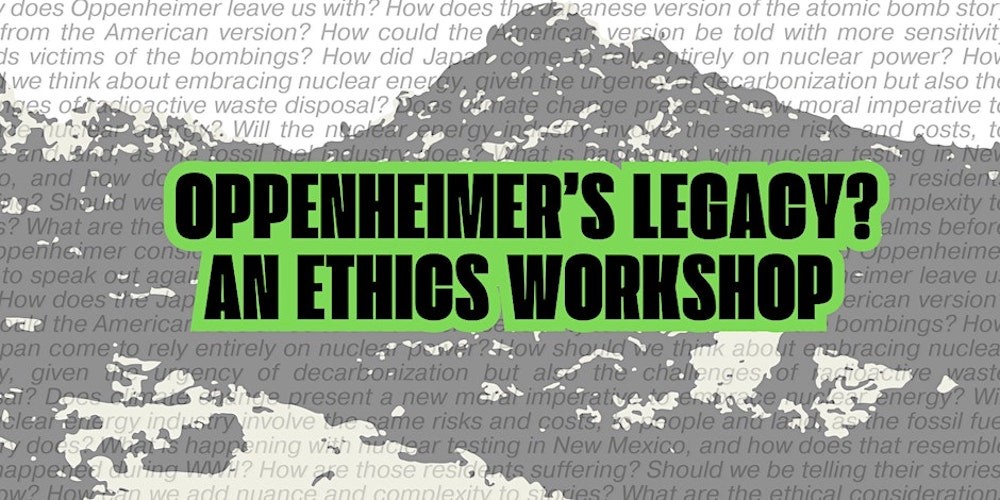Please join us for “Oppenheimer’s Legacy,” a collaborative, interactive ethics workshop using the film Oppenheimer to explore questions of ethics in science, storytelling, history, and energy policy. Presentations by our featured guests will be followed by discussion and a writing prompt, that will encourage the audience to reflect upon and share the various ethical difficulties they encounter in their respective fields.
This event is collaboratively hosted by Columbia’s School of the Arts, School of Professional Studies, and the Graduate School of Arts & Sciences. It is organized by one of the Climate School’s Earth Networks Program, which aims to bridge scientific and artistic approaches toward addressing the climate crisis and is led by led by Professor Anelise Chen, School of the Arts, and Lynnette Widder, School of Professional Studies.
Panelists
- Ivana Nikolic Hughes is the Director of Frontiers of Science and Senior Lecturer in the Department of Chemistry
- Carol Gluck is a George Sansom Professor Emerita of History
- Michael Gerrard is a Professor and Faculty Director at the Sabin Center for Climate Change Law and Columbia Law School
- Heather E. Radke, Adjunct Assistant Professor at Columbia University’s School of the Arts
We will discuss the following questions:
Physics:
In Oppenheimer, there is a notable exchange between Robert Oppenheimer and I.I. Rabi, who says, “I don't wish the culmination of three centuries of physics to be a weapon of mass destruction” to which Oppenheimer responds, “I don’t know if we can be trusted with such a weapon, but I know the Nazis can’t. We have no choice.” How was the historical context of WWII relevant to Oppenheimer’s decision to build the bomb? What were Oppenheimer’s moral qualms before and after? When did he begin to speak out against nuclear proliferation, and why? What is the legacy that he leaves us with? What is Columbia’s involvement in this history of creating the atomic bomb? Where are we now?
History:
Over the summer, in Japan, there were protests against the film for insensitivity towards victims of the bombings. We know that there are two different stories, the Japanese version and the American version. What is the Japanese version of the atomic bomb story? How could the film have been more balanced in viewpoint?
Law:
Given the history of nuclear weapons and accidents, which continue to pose problems, most recently this summer, in NY State and Japan, with disposal of treated nuclear waste water, what does one do with the combined urgency of decarbonization and the unresolved problem of nuclear waste disposal? Given the imperatives of climate change, is there a similar moral imperative now to embrace nuclear energy despite our experience with radioactive waste and the problems of disposal? What’s similar, what’s different to what was happening in 1945? Is there a continuum between the landscapes and people sacrificed for nuclear testing and the inevitable sacrifice of land and people for mining, refining and waste disposal in the context of nuclear energy? How might we come to terms with understanding the long-term impacts of nuclear waste in particular, which remains toxic for a duration in some cases longer than human history?
Storytelling:
Artists and storytellers know intimately how every story has an agenda and a consequence. Was “Oppenheimer” a one-sided story that focused too heavily on the moral qualms of the scientist without showing the perspective of those who were harmed by the bomb? Do you think that intimate character portraits are the only way to make the viewer feel something powerful, and so the tradeoff is warranted?
